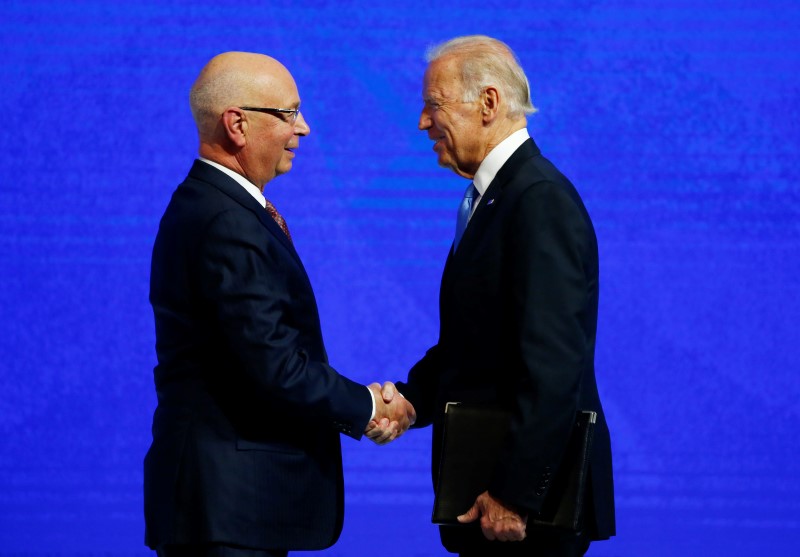By Kirsten Donovan and Elizabeth Piper
DAVOS, Switzerland (Reuters) - Blood-letting in global markets is dominating corridor talk as business leaders and policymakers meet in Davos, although so far the view is that it doesn't signal a financial crisis.
As the World Economic Forum's annual meeting in Switzerland wrestled with topics ranging from the impact of robots on jobs to gender and wealth inequality, the MSCI World equity index (MIWD00000PUS) fell to its lowest level since July 2013.
If sustained, the 9.9 percent fall in the index in January would be the worst monthly loss since 2009, towards the end of the global financial crisis.
"I don't believe this is a repeat of 2008...that is not to say that there are not some very significant risks impacting the market - not least of which is China's slowing growth," John Veihmeyer, Global Chairman of accounting group KPMG, said in the Reuters Global Markets Forum on Wednesday.
The International Monetary Fund (IMF) cut its global growth forecasts for the third time in less than a year to 3.4 percent on Tuesday, as new figures showed that the Chinese economy grew at its slowest rate in a quarter of a century in 2015.
While China's rapid slowdown, combined with a dramatic fall in the price of oil, has spooked investors around the globe, European Economics Commissioner Pierre Moscovici told Reuters Television he too did not believe there would be any return to an international financial crisis.
"I don't feel that the financial crisis is coming back... but there are downsides that we need to address," he said.
"There are worries... especially about China which is undergoing a transition which is difficult and uncertain."
HARBINGER OF PROBLEMS
However, some in Davos were less confident about the outlook for 2016 after the rocky start to the year.
"Market turmoil can be a harbinger that something is wrong and even if it is irrational, can have real consequences. What is going on now is a message that the excessive optimism that has been spreading around is wrong," Nobel Prize-winning U.S. economist Joseph Stiglitz told Reuters.
While Moscovici said he was confident that the world's central banks have the ammunition to revive the global economy after years of record low interest rates and quantitative easing, Stiglitz was not convinced.
"The Fed (U.S. Federal Reserve) doesn't get it. The Fed raises interest rates, Brazil raises interest rates in a world in which things are not good. Central banks are often more out of tune with reality than markets," Stiglitz said, adding he saw no chance of any intervention at a G7 or G20 level.
Veteran British businessman Roger Carr, who is chairman of British defence group BAE Systems (L:BAES), said the future was not looking bright.
"This time last year in Davos there was a very different environment, it was quite benign. The issue was the haves and the have nots, it wasn't: 'are we all going to have less?'."
"It is very pessimistic at the moment," he told Reuters.
HEALTHY CORRECTION
However, bankers such as former Barclays (L:BARC) chief executive Bob Diamond said the slowdown in Chinese growth was a "healthy correction" which, while serious, was needed.
Diamond, who now invests in Africa, told reporters that the situation now was not comparable to the fourth quarter of 2008 and the first of 2009 which he described as "the deepest economic correction I have ever seen" as the U.S economy was growing and western Europe was doing well.
This was echoed by Professor Ding Yuan, vice-president and dean of the China Europe International Business School in Shanghai, who told Reuters it would be wrong to take the small devaluation of the Chinese yuan and the falls in the Shanghai 300 index as indicators of China's economic health.
"This is only short-term volatility... People are focussing on the short term too much. We should be looking at the next five years, not the next two months," he said.
For CEOs at Davos trying to navigate the year ahead, the price of oil remains the great unknown.

"In many of the markets we operate in, the oil price is clearly a major factor of the health of the economy. We're expecting governments to adapt to this new current order of oil prices, whether they're at $30 or lower or higher. Who knows what's going to happen in 2016?" Vimpelcom CEO Jean-Yves Charlier told Reuters in an interview.